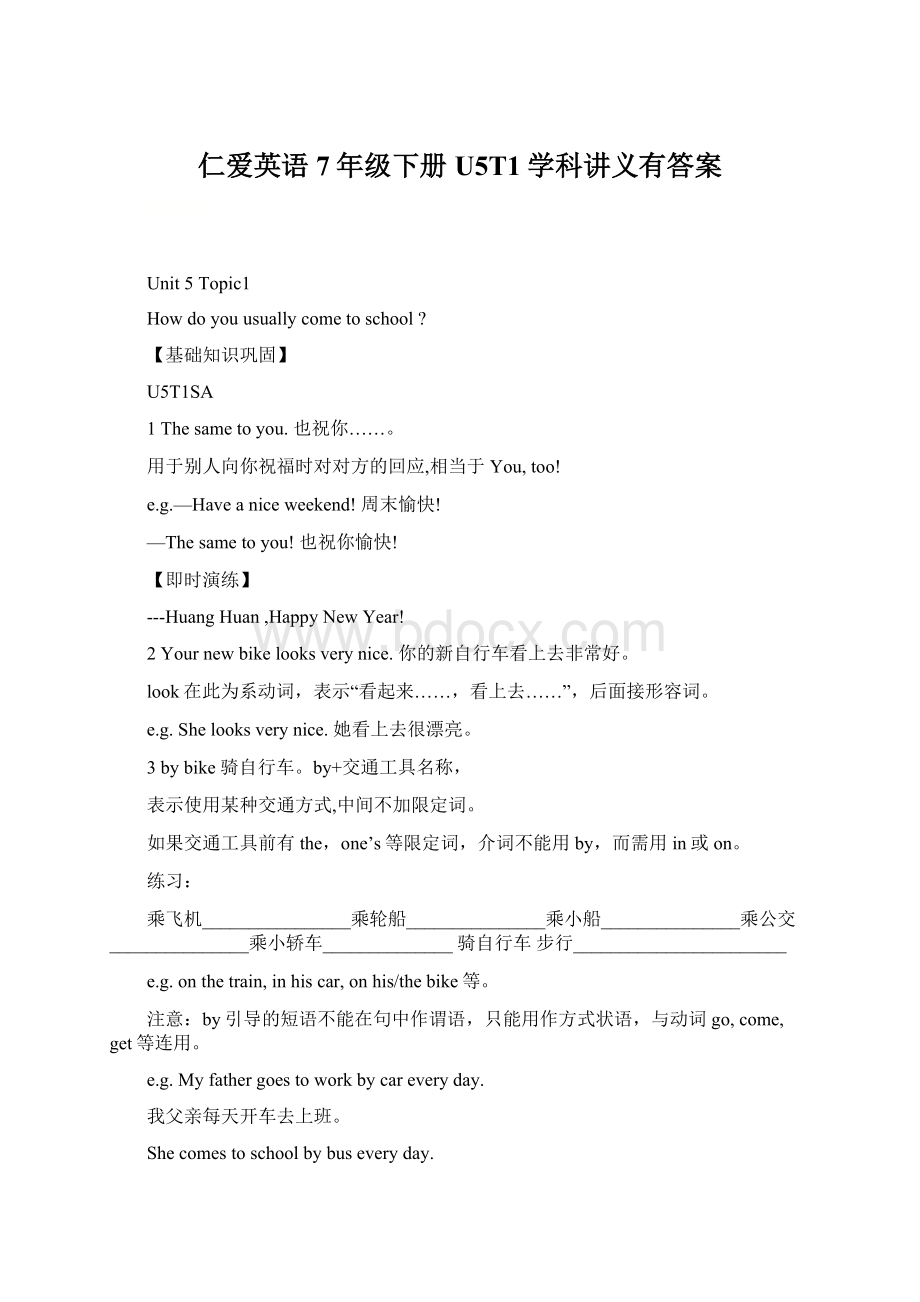仁爱英语7年级下册U5T1学科讲义有答案.docx
《仁爱英语7年级下册U5T1学科讲义有答案.docx》由会员分享,可在线阅读,更多相关《仁爱英语7年级下册U5T1学科讲义有答案.docx(13页珍藏版)》请在冰豆网上搜索。

仁爱英语7年级下册U5T1学科讲义有答案
Unit5Topic1
Howdoyouusuallycometoschool?
【基础知识巩固】
U5T1SA
1Thesametoyou.也祝你……。
用于别人向你祝福时对对方的回应,相当于You,too!
e.g.—Haveaniceweekend!
周末愉快!
—Thesametoyou!
也祝你愉快!
【即时演练】
---HuangHuan,HappyNewYear!
2Yournewbikelooksverynice.你的新自行车看上去非常好。
look在此为系动词,表示“看起来……,看上去……”,后面接形容词。
e.g.Shelooksverynice.她看上去很漂亮。
3bybike骑自行车。
by+交通工具名称,
表示使用某种交通方式,中间不加限定词。
如果交通工具前有the,one’s等限定词,介词不能用by,而需用in或on。
练习:
乘飞机________________乘轮船_______________乘小船_______________乘公交_______________乘小轿车______________骑自行车步行_______________________
e.g.onthetrain,inhiscar,onhis/thebike等。
注意:
by引导的短语不能在句中作谓语,只能用作方式状语,与动词go,come,get等连用。
e.g.Myfathergoestoworkbycareveryday.
我父亲每天开车去上班。
Shecomestoschoolbybuseveryday.
她每天坐公共汽车来上学。
【即时演练】
1.---Howdoyouusuallygotoschool?
---Iusuallyabustoschool.
2.Annoftengoestoworkbike,butsometimesshegoestoworkcar.
3.SometimesLinWeiabiketotheshop.
A.rideB.driversC.rides
4Howdoyouusuallycometoschool?
是由how引导的特殊疑问句,对交通方式进行提问,通常用bybike,bytrain,bycar,bybus,byplane/air,byship/sea等来回答。
e.g.—Howdoesyourmothergotowork?
你妈妈怎样去上班?
—Shegoestoworkbycar.她开车去上班。
5comeon1)快点儿,快
e.g.Comeon!
Wedon’thavemuchtime.
快点!
我们时间不多了。
2)加油,加把劲
e.g.Comeon!
Tryoncemore.加把劲!
再试一次。
7onfoot步行,走路,意思相当于walk(to)。
注意:
foot用单数,前面不加定冠词。
e.g.Igotoschoolonfoot.=Iwalktoschool.我步行去上学。
【即时演练】
---Tom,Howdoyougotoschool?
---Myhomeisnearmyschool,soIgotoschool.(步行)
U5T1SB
1onweekdays在工作日,平日;
onweekends在周末
e.g.Iusuallystudyhardonweekdaysandhaveagoodrestonweekends.
我通常平日努力学习,周末好好休息。
【即时演练】
---Doyouhavelunchatschoolweekdays?
---No,Ihaveitathome.
2Theearlybirdcatchestheworm.早起的鸟儿有虫吃。
也可译为“捷足先登”或“笨鸟先飞”。
early的反义词为late。
3ride动词,意为“骑(车、马等);搭乘,乘车”。
e.g.Theboysoftenridetheirbikesaroundthestreets.男孩子们经常骑着自行车在街上兜风。
4takethesubwayhome乘地铁回家,也可说成gohomebysubway。
注意:
这里subway前用地冠词the而不用a。
home在此是副词,其前不可加介词to,意为“到家”。
e.g.gethome到家;onone'swayhome在……回家的路上
U5T1SC
1have...classes意为“上……课”。
e.g.haveanEnglishclass上英语课;haveclasses上课
另外,have还有“吃,喝;有;进行”之意。
e.g.havebreakfast吃早餐注意:
三餐前不加冠词。
2forashorttime意为“一会儿”,也可说成foramoment。
3gotobed上床睡觉。
2、频度副词
1.定义:
usually/sometimes/always/often等词在英文中被称为“频度副词”,是用来表示
动作频率的,但程度上有别。
常见频度副词按频率大小排列如下:
always(100%)>usually(80%)>often(60%)>sometimes(40%)>seldom(20%)>never(0%)
2.频度副词的位置
◆频度副词在句中习惯上位于be动词、助动词等之后,行为动词之前。
1.在be动词之后。
如:
Sheissometimesverybusy.她有时很忙。
2.在第一个助动词或情态动词之后。
如:
Iwillneverforgetthislesson.我将永远忘不了这一课。
3.在实义动词之前。
如:
Weoftengothere.我们常去那儿。
◆sometimes也可放在句首、句中或句末,often也可放在句末(一般不放在句首)。
如:
Sometimesshewritestome.=Shewritestomesometimes.她有时候给我写信。
Shewritestomeoften.她经常给我写信。
◆如果有两个助动词,频度副词通常放在第一个助动词后面。
如:
Wehaveneverbeeninvitedtooneoftheirparties.他们聚会,一次也没邀请过我们。
Shemustsometimeshavewantedtorunaway.她有时候一定想到过要逃走。
特殊疑问句:
1.特殊疑问句=特殊疑问词+一般疑问句
特殊疑问词
意思
对…提问
what
什么
东西
where
哪里
地点
when
何时
时间
who
谁
人
whose
谁的
某人的东西(所属)
which
哪一个
选择
why
为什么
原因
how
怎么样
方式,方法
【典型例题讲解】
Ⅰ.单项选择。
(10分)
()1.TheBrownsusuallydrivetotheparkonSundays.Buttodaytheygotothepark
_____foot.
A.inB.onC.byD.of
()2.Boboften_____hishomeworkafterdinner.
A.doB.doesC.doingD.todo
()3.Theboylikesplaying_____basketballverymuch.
A.aB.anC.theD./
()4.—_____doesKangkangmeethisfriends?
—Fourtimesamonth.
A.HowoftenB.Howlong
C.WhenD.Whattime
()5.—Whatdoyouusuallydo_____weekdaysafterschool?
—Iusuallyreadbooks.
A.inB.atC.onD.for
()6.Mr.Kingsometimes_____thesubwayhome.
A.takeB.takingC.takesD.totake
()7.—WhatdoesFangYandoinherfreetime?
—Sheoften_____amovie.
A.seesB.watchC.looksD.read
()8.—_____
—Thesametoyou.
A.Goodmorning!
B.HappyNewYear!
C.Seeyoulater.D.Howdoyoudo?
()9.ZhaoLin_____toBeijingbytrainoften.Heusuallygoesbyplane.
A.isn’tgoingB.doesn’tgoC.notgoD.don’tgo
()10.—Yournewdresslooksverynice!
—_____
A.Yes,itissonice.B.Where?
Where?
C.Thankyou.D.That’sallright.
【随堂练习巩固】
Ⅰ.词汇部分。
(10分)
(A)根据句意及首字母提示,在空白处填入适当的单词。
41.—Oh,it’s4:
30p.m.Schooliso_____.Let’sgohome.
—Allright.Let’sgo.
42.—DoesJaneoftenreadbooksinthel_____?
—Sorry,Idon’tknow.
43.LinDandoesn’tlikereadingbooks.Healwaysl_____tomusic.
44.—Howoftendoyougotothepark,Jane?
—O_____aweek.
45.—Whattimedoclassesb____inthemorning?
—Ateight.
(B)根据句意,用括号内所给单词的适当形式填空。
46.—WhatdoesEllenusuallydoafterschool?
—Sheusually_____(watch)TV.
47.—Howdo_____(America)studentsusuallygotoschool?
—Well,theyusuallywalkortakeayellowschoolbustoschool.
48.Bettywritestohisfather_____(two)aweek.
49.Heusuallygoes______(swim)inhisfreetime.
50.YuJingsometimes_____(ride)abiketoschool.
Ⅱ.句型转换。
(每空一词)(5分)
51.Theoldmanalwayswalkstotheshop.(改为反义句)
Theoldman__________totheshop.
52.Mikeoftengoestothezoobybus.(改为同义句)
Mikeoften_____a_____tothezoo.
53.Mrs.Readgoesshoppingthreetimesaweek.(对画线部分提问)
__________doesMrs.Readgoshopping?
54.IusuallyreadbooksonSundays.(对画线部分提问)
_____doyouusually_____onSundays?
55.MariaoftenvisitstheGreatWall.(改为一般疑问句)
_____Mariaoften_____theGreatWall?
【课后强化练习】
Ⅱ.情景交际。
(5分)
根据对话的情景,从方框中选择适当的句子填在画线处,使对话完整通顺。
其中有两项是多余的。
A:
Hi,WangLi!
Whattimedoyouusuallygetup?
B:
Ialwaysgetupataboutsixo’clock.
A:
11Howdoyouusuallygotoschool?
B:
12ButsometimesIgotoschoolbybus.
A:
Bytheway,wheredoesyourmotherwork?
B:
Sheworksinafactory.Shemakesshoes.
A:
13
B:
Sheusuallygoestoworkbysubway.
A:
Wheredoesshehavelunch?
B:
14Ittakeshertoomuchtimetocomebackhomeforlunch.
A:
Oh,it’stimeforclass.15
B:
Let’sgo.
A.Theearlybirdcatchestheworm.
B.Howdoessheusuallygotowork?
C.Bybike.
D.Howoftendoesshegotowork?
E.Shehaslunchinthefactory.
F.Whataboutyou?
G.Comeon!
11.12.13.14.15.
Ⅲ.完形填空。
(10分)
OnSundays,LiLeigetsupatsixthirty.Hehas16ateight.Thenhehelpshismother
17thehousework(家务劳动).Atteno’clockheleaves18andgoesshopping19
bike.Atabouteleveno’clockhecomes20home.
Helikes21verymuch.Hehelpshismotherwiththecooking.They22lunchattwelve.
Intheafternoonheoften23gameswithhisfriends.Theyhave24atsixthirty.Intheeveninghedoeshishomework.Sometimes,he25TV.Hegoestobedatnine.
()16.A.foodB.breakfastC.lunchD.supper
()17.A.inB.onC.withD.from
()18.A.homeB.houseC.roomD.classroom
()19.A.byB.onC.inD.at
()20.A.forB.toC.backD.from
()21.A.cookB.cookingC.thecookD.thecooking
()22.A.tohaveB.havingC.haveD.has
()23.A.playsB.isplayingC.takesD.istaking
()24.A.workB.homeworkC.houseworkD.dinner
()25.A.seesB.looksC.iswatchingD.watches
Ⅳ.阅读理解。
(30分)
(A)
Hi,I’mZhuHua.I’majuniorhighschoolstudentinBeijing.Therearetwenty-sixboysandtwenty-twogirlsinmyclass.Halfofthestudentscometoschoolbybike.Fiveboysandfourgirlscometoschoolonfoot.Aboutaquarterofuscometoschoolbybus.Theotherscometoschoolbysubway.We’reallfromChina.We’regoodfriends.
根据短文内容,完成下面表格。
Thereare26.__________studentsinZhuHua’sclass.
Howtocometoschool
By27._____
Bysubway
By28._____
Onfoot
Number
Twenty-four
29.______
Twelve
30.______
(B)
Aliceismygoodfriend.Sheistwenty-twoyearsold.NowshelivesinBeijing,China.SheteachesEnglishinajuniorhighschool.Shelovesmakingfriendswiththestudentsandtheylikeherverymuch.Everymorningshegetsupveryearly.Atabout7:
00,sheusuallyhasaglassofmilkandsomebreadforbreakfastathome.Thenshewalkstoworkandgetstoschoolataboutaquartertoeight.At12:
00sheeatsahamburgerandanappleforlunch.HerfavoritedrinkisCoke.Shegoeshomeat5o’clockintheafternoon.Shelikestohavenoodles(面条)andchickenfordinner.OnSunday,sheoftencomestoseeme.SometimeswegotoaChineserestauranttohavelunch.
根据短文内容,选择正确答案。
()31.Aliceis_______.
A.adoctorB.anurseC.adriverD.ateacher
()32.—WhatdoesAliceusuallyhaveforbreakfastathome?
—_______
A.Aglassofmilkandsomebread.B.Aneggandsomebread.
C.Acupofcoffeeandsomebread.D.Aglassofmilkandahamburger.
()33.Alicegetstoschool_______a.m.
A.at8:
15B.at7:
45C.at7:
40D.at8:
00
()34.—WhatdoesAliceoftendoonSunday?
—Sheoften________.
A.hasdinnerwithmeB.goestotherestaurant
C.comestoseemeD.eatsnoodles
()35.WhichofthefollowingisNOTtrue?
A.AlicelivesinChinanow.
B.AlicelikesCokebest.
C.Alicegetshomeat5:
00intheafternoon.
D.Onweekdaysshehasahamburgerandanappleforlunch.
(C)
Whatwedoanddon’tdoinourfreetime
LiHuimin
WangJunfeng
ChenQiang
WatchTV
√
√
√
Meetfriends
√
√
×
Cookfood
√
×
×
Gofishing
×
√
√
Playcomputergames
×
√
√
根据表格内容,选择正确答案。
()36.LiHuimin,WanJunfengandChenQiangall_____intheirfreetime.
A.watchTVB.meetfriendsC.cookfoodD.playgames
()37.ChenQiangdoesn’t_____.
A.meetfriendsB.cookfoodC.watchTVD.AandB
()38.LiHuiminandWangJunfeng_____intheirfreetime,butChenQiangdoesn’t.
A.gofishingB.